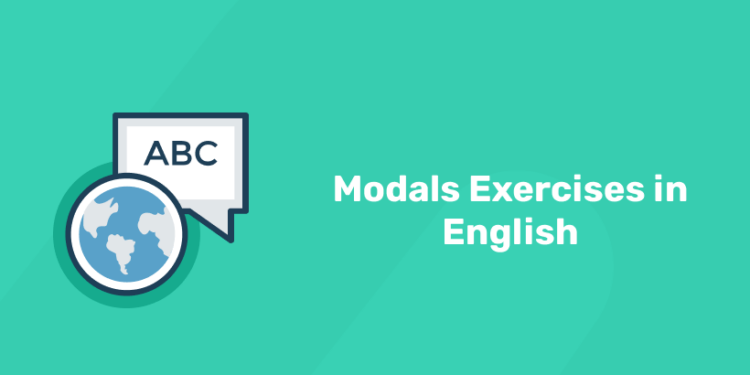What are modal verbs? Modal verbs are words that indicate the ability of a noun to perform an action and the likelihood or probability that an action will occur. will, would, can, could, may, could, should, should, must, must are the most commonly used modal verbs. In this article, you will find exercises based on modal verbs. Check them out.
Learn English with Aparna Mulberry!!! Click Here
Modal Exercises with Answers
Complete the following exercises and check the answers to find out if you know them well.
Fill in the blanks with the correct modals
- He knew that he _______ (Would/ must) be able to reach office in time.
- You ______ (dare/ could) not enter my house again.
- I thought he ______ (should/ would) be at school.
- Raman _____ (can/ should) speak in two voices.
- I _____ (can’t/ couldn’t) write what you spoke.
- You _____ (should/ can) have told me earlier.
- _____ (Can/ Should) i get something to drink, please? I am very thirsty.
- _______ (Can/ Should) I use your car, please?
- You ______ (can/ would) go in now and meet the doctor.
- I _______ (would/ should) love to teach these children.
- I ______ (could/ can) eat 5 bananas at a time when i was young.
- You _____ (must/ will) see the lawyer at once.
- ______ (May/ Might) god protect you from the pain and agony.
- My mother ______ (can/ could) watch T.V for hours even now.
- It _______ (would/ may) be cold in the evening, who knows?
- I __ arrange the flowers for the bouquet. (may/can)
- __ I borrow this pen from you? (may/might)
- The teacher __ ask you to bring the homework. (might/can)
- According to the weather forecast, it ___ snow heavily tomorrow. (may/shall)
- Raj hasn’t studied well. He __ fail his exam. (might/shall)
- You __ follow the traffic rules. (may/must)
- It __ be difficult to live amidst war. (should/must)
- My mother __ scold me if I don’t go back on time. (will/may)
- We ___ take care of our parents. (ought to/ could)
- I __ visit the local grocery store soon. (shall/can)
- You ___ be punctual. (should/ought)
- One __ repay all their debts. (must/ought to)
- __ you show me the road to the market? (could/might)
- The child __ be taken to hospital immediately. (must/might)
- ___ you have hot chocolate? (shall/will)
- My teacher (can/must) speak four languages.
- (May/should) I use your mobile to call my mother?
- You (must/could) not speak loudly in the hospital.
- I (could/must) use a little help in packing all these clothes.
- Madam (could/may) you repeat what you said?
- I (can/might) not be able to make it tonight.
- Sheldon (ought to/must) study more if he wants to pass the test.
- (Can/May) you come to the prom with me?
- My parents (shall/ought to) arrive soon.
- I (could/must) be late as I have a lot on my plate.
- Leonard (can/may) easily solve the problem.
- It (might/should) rain tomorrow.
- (May/might) all your wishes come true in life.
- I (could/might) not be any happier.
Learn English with Aparna Mulberry!!! Click Here
Speak english like a native ! join now !!
Answers
- Would
- Dare
- Would
- Can
- Couldn’t
- Should
- Can
- Can
- Can
- Would
- Could
- Must
- May
- Can
- May
- Can
- May
- Might
- May
- Might
- Must
- Must
- Will
- Ought to
- Shall
- Should
- Ought to
- Could
- Must
- Will
- Can
- May
- Must
- Could
- Could
- Might
- Must
- Can
- Shall
- Could
- Can
- Might
- May
- Could
Learn English with Aparna Mulberry!!! Click Here











